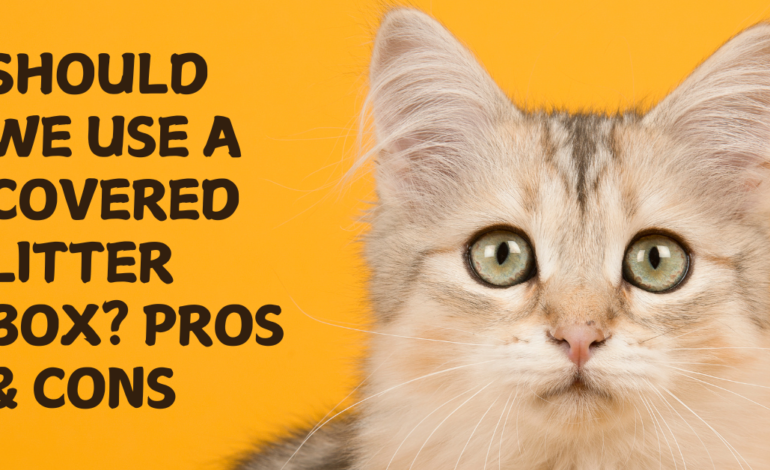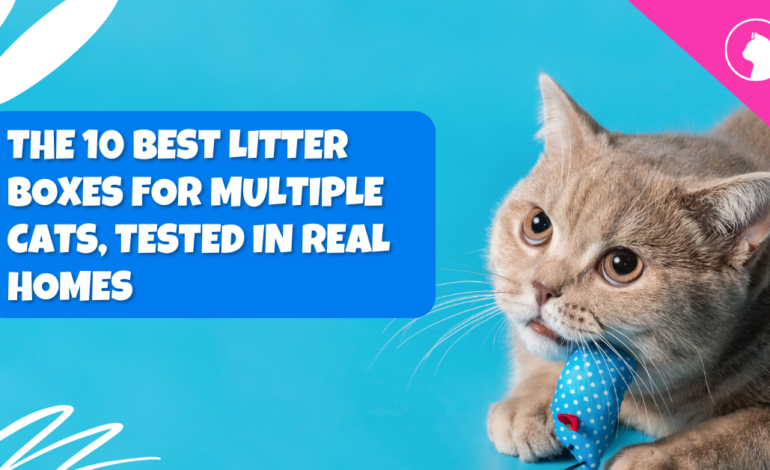Should We Use a Covered Litter Box? Pros & cons
- By MeowCareHub
- March 30, 2025

Introduction
Picking a cat litter box that augments your feline’s comfort and your hygiene needs can be tricky; the conundrum between an operative uncovered litter box and a more private covered one presents itself readily. One of them straddles the line of a classic covered box: does it offer enough benefits to be worthwhile like easier cleanup and better odor control? While these boxes would certainly help decrease odor, privacy for your kitty, and minimize litter all over the floor, not all cats might appreciate them. For some, covered boxes can be suffocating and distressing. This article endeavors to aid you in deciding whether or not a covered litter box fits your feline by explaining the common questions and the benefits and disadvantages of using one, along with ways to modify your cat’s behavior to make them more willing to cuddle up inside the box.
What is a Covered Litter Box?
A covered litter box is a litter box that comes with a cover or hood to enclose the litter area to give the cat privacy and minimize odor. Such boxes have litter scatter, odor control, and are favored by most cat owners. Covered litter boxes can also be designed in different styles and functionality to cater to the varying needs of cats and homes.
Covered Litter Box Types:
- Hooded Litter Box: The traditional covered box with a removable hood for simplicity of cleaning intentions.
- Top-Entry Litter Box: In which cats come in through the top, lessening litter scattering and dirt.
- Enclosed Automatic Litter Box: Self-cleaning (ie:Litter-Robot) odor-controlled with minimal maintenance.
Do Cats Prefer Covered or Uncovered Litter Boxes?
According to a 2013 Ross University School of Veterinary Medicine study, of the cats tested, 70% did not show a definitive preference for covered or uncovered litter boxes. However, individual preferences may be shaped by the context of the environment, the temperament of the cat, or the design of the box itself.
When Cats May Prefer Covered Boxes:
- Cats that like to have privacy when eliminating.
- Cats in multi-pet homes who may need a place where they can be secluded.
- Cats will feel more secure in an enclosed space.
When Cats May Not Prefer Covered Boxes:
- Boxes that are too small or cramped, limiting movement.
- Lack of ventilation would cause odors to get trapped, causing an unpleasant experience for the cat
- Older cats or cats with mobility issues may have difficulty entering into covered boxes.
Pros and Cons of Covered Litter Boxes
| Pros | Cons |
| Odor Control: Traps smells and contains them effectively. | Trapped Odors: Poor ventilation can lead to unpleasant smells. |
| Privacy: Provides cats a more private and secluded space. | Limited Space: Smaller boxes can be cramped for larger cats. |
| Reduced Litter Scatter: Keeps litter from being kicked out. | Potential Stress: Some cats may feel trapped or cornered. |
| Aesthetics: Blends well with home decor, hides litter box. | Out of Sight, Out of Mind: Less visible, leading to infrequent cleaning. |
| Prevents Dog Access: Keeps curious dogs away from cat waste. | Ventilation Issues: Moisture and odor can accumulate inside. |
Are Covered Litter Boxes Bad for Cats?
Covered litter boxes should not be regarded as bad litter boxes, however they can become disgusting and uncomfortable if not taken care of. If a covered litter box is allowing urine and feces to build up, the cat may not want to use it because of the odor. However, when the litter box is kept clean and does not have stale litter for long periods of time, covered litter boxes can be a comfortable and secure environment, as well as odor-free environment, for pet cats.
How to make covered litter boxes comfortable:
- Keep the litter box large enough for the cat to turn around and get comfortable.Keep the covered litter box ventilated so the odor does not build up.
- Be sure to change the litter daily to keep it fresh.
- If you do not want to clean, consider a self-cleaning covered litter box, like the Litter-Robot 4.
Best Covered Litter Boxes for Cats
Here are some popular and highly-rated covered cat boxes available online:
| Litter Box | Features | Pros | Cons | Buy Now |
| Litter-Robot 4 | Self-cleaning, odor control, app connectivity | Minimal effort, low odor | Expensive, may scare some cats | Buy on Amazon |
| Modkat Top-Entry Box | Top-entry, sleek design | Prevents litter tracking | Small size, pricey | Buy on Amazon |
| Petmate Basic Hooded Litter Box | Hooded design for privacy, built-in handle for easy lifting, charcoal filter to control odors | Affordable and easy to clean, good size for most cats | Basic design, not ideal for larger cats | Buy on Amazon |
| Nature’s Miracle Hooded Box | Charcoal filter, odor control | Good for odor reduction | Large size, may take space | Buy on Amazon |
| Petmate Booda Dome | Dome design, privacy | Stylish, controls odor | Small for larger cats | Buy on Amazon |
Transitioning Your Cat to a Covered Litter Box
Kittens might be apprehensive to use a covered litter box, but with time and proper strategy, transitioning is possible.
Step-by-Step Transition Tips:
- Introduce Gradually: Try to close the lid only once your cat has fully adjusted to the box and its sleep __cpLocation.
- Place Both Boxes: Initially, positioned both the covered and uncovered boxes next to one another.
- Encourage Exploration: Draw your cat to the new box with treats or some catnip.
- Monitor Usage: Watch their behavior. If they still show avoidance, reevaluate your strategies.
Where Should You Place a Covered Litter Box?
The placement of a covered litter box is important in helping your cat feel confident about using it on a consistent basis. If the box is poorly placed, it can lead to avoidance and accidents in the house.
It is better to put the covered box in:
- Quiet Spaces: A quiet, low-traffic place will help the cat feel secure. Do not place it around busy or noisy spots (e.g., the corner of the house with the washing machine could startle or create risk of stress).
- Food & Water: Cats like to keep their elimination area separate from food and water. Placing the box in a new part of the house can help reduce odor and allow for easier observation into the litter box for urine and fecal consistency.
- Provide Easy and Consistent Access: The box needs to be readily accessible to the cat for it to use it comfortably. Make sure the box is located in a room that is generally open, and does not require the cat to navigate through furniture or obstacles. It is especially important that an older cat or cat with mobility limitations can get into and around the box easily without barriers.
Conclusion: Should You Use a Covered Litter Box?
Covered litter boxes come with many benefits – better odor control, privacy for your cat, and a cleaner looking home – they aren’t always wholly suitable for all cats. Maintaining a clean, large, and breathable box can all be beneficial to your cat feeling comfortable in a covered box. If your cat adjusts well to a covered litter box, it can be helpful in keeping your home clean. If your cat appears to prefer an uncovered box, you want to respect that and consider avoiding litter box issues. Are you looking for the right litter box?
Check out Meow Care Hub’s expert picks for the right fit for you and your cat!
FAQs About Covered Litter Boxes
- Are covered litter boxes better for odor control?
Covered litter boxes can help to limit the spread of odor because they contain the smells inside. Still, they will need to be cleaned out regularly in order to keep odors from building up.
- Do cats prefer covered or uncovered litter boxes?
In general, cats do not show preferences for either covered or uncovered litter boxes. However, covered litter boxes that are large and have good ventilation seem to be more appealing to cats.
- Are enclosed litter boxes safe for cats?
Enclosed litter boxes are safe for cats as long as they have enough space and ventilation. In general, look for boxes that are larger in size and have easy accessibility for your cat.
- How often should I clean a covered litter box?
It is best to clean a covered litter box every day or so to keep smells from building up and creating a smelly environment for your cat.
- Can covered litter boxes reduce litter tracking?
Yes, covered litter boxes can help to limit scatter, but the top-entry litter box styles do a particularly good job of containing the litter.





